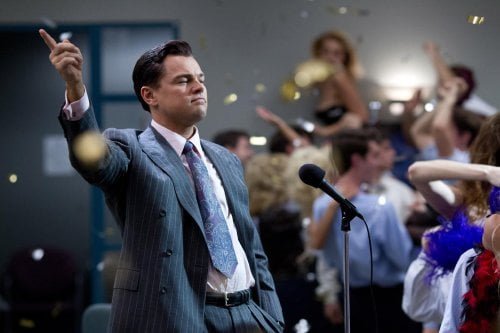The Wolf of Wall Street

In the late 1980's, Jordan Belfort (Leonardo DiCaprio) was the son of accountants from Queens who was thrilled to be hired as a stockbroker by Mark Hanna (Matthew McConaughey, supporting MVP). But when Black Monday arrived in 1987, Jordan found himself unemployed with a wife to support, and so he answered an ad at Investacenta and discovered the boiler room business of penny stocks. Jordan beat his new employers at their own game and started his own firm, Stratton Oakmont, in a garage. When he decided to move his client base from plumbers and postmen to the very wealthy, Jordan became "The Wolf of Wall Street."
Laura's Review: B+
Screenwriter Terence Winter (HBO's 'The Sopranos,' 'Boardwalk Empire') found "Goodfellas" beats as he adapted Belfort's no-holds-barred book and so director Martin Scorsese's "The Wolf of Wall Street" becomes the second film this holiday season to echo his earlier masterpiece. Scorsese, who had been swept into the cocaine culture of the 70's, depicted the drug's usage in that film, but he has never made a film this manic and depraved (and laugh-out-loud funny). By exulting in the world of these predators, addicted to drugs and sex and material excess, he's drawn criticism for condoning it, but no matter how funny and ofttimes charming these sharks were, their contempt for everyone outside their own realm and the lives they ruined comes through loud and clear. It is ironic then, that the film begins to lose air as Belfort's downfall begins, but it's a wild ride for just over two of its three hour running time. Scorsese throws us into the pinnacle of 80's greed before backtracking. A slick ad for Stratton Oakmont fetishizes the bull market, before we're plunged into Belfort's motivational entertainment on his trading floor - dwarf tossing - and his arrival later that night at his seven acre spread near crash-landing his helicopter after his daily diet of twenty Quaaludes. (DiCaprio's accented voiceover even sounds like Ray Liotta's Henry Hill.) But Jordan Belfort started out just wanting a secure income to begin his life with wife Teresa (Cristin Milioti, 'How I Met Your Mother's' mother), until, that is, he meets Hanna, the man who indoctrinates him into the 'Fugazi' concept of plundering other people's money with a chest-thumping war cry during a multiple martini lunch. The mild mannered accountant's son discovers his natural salesman and the high of effortlessly earning millions. A Forbes piece which unveils his practices just fuels his ascent, more brokers clamoring to work for him. When FBI Agent Patrick Denham (Kyle Chandler) starts sniffing around, it merely emboldens him, using his new supermodel wife Naomi's (Margot Robbie, "About Time") British Aunt Emma (a rather flat Joanna Lumley) to sock millions away with Swiss banker Jean-Jacques Saurel ("The Artist's" Jean Dujardin). DiCaprio plays Belfort like some crazed cult leader, his inspirational speeches spewing blood into his traders' waters. In his best scene, DiCaprio displays a knack for physical comedy heretofore unearthed as he makes his way to his Ferrari legless on an overdose of particularly powerful 'ludes. He's also funny in his sexual indulgences, whether reacting to a dominatrix's placement of a candle where the sun don't shine or panting for his wife's privates as she lays down her law (the film was trimmed to avoid an NC-17 rating). The actor does the impossible, keeping us on the side of this contemptible antihero through sheer confidence and the occasional glimmer of regret. If Scorsese's film eventually deflates, DiCaprio at least nails the landing, sending it out on a high, thematic note. It's the comedic performance of the year. He's ably supported by Jonah Hill as Belfort's partner Donnie Azoff, the strange man who approaches him in a diner wanting to know the secret to Jordan's obvious wealth. Hill's weirdness borders on caricature, but his character, who is unabashedly married to his first cousin, supports it. But it is DiCaprio and Hill together who signal "Wolf's" eventual slide, a choking scene so extended one expects the improv to descend into giggling. Robbie, who strongly resembles a younger Jaime Pressly (the presence of 'Your Name Is Earl's' Ethan Suplee in the cast undoubtedly accentuates this), is sure to join the A-list after her sparkling turn as Belfort's second wife, a young woman dazzled by his wealth and charm who learns all too soon the behavior which supports it is not what she bargained for. Other filmmakers are on board to play in Scorsese's playpen with Spike Jonze as a penny trader; Rob Reiner portraying Jordan's dad and dumbfounded, apoplectic Stratton Oakmont CFO Max Belfort and Jon Favreau as Manny Riskin. The production is all we expect from Scorsese, the 80's scene projected from rags to riches by production designer Bob Shaw and costumer designer Sandy Powell. Scorsese's a maestro of music selection, using artists from Billy Joel to Romeo Void. But again, in keeping with the film's late slide, visual effects supervisor Rob Legato disappoints with a not-quite-convincing storm at sea disaster and while Scorsese stalwart editor Thelma Schoonmaker maintains the film's dizzying high wire energy, the length of that transitional DiCaprio/Hill scene nags. "The Wolf of Wall Street" is certainly one of Scorsese's most enjoyable films, especially among his later work, but it's more of a three hitter than a home run. Call this one 'Chutzpah and Loathing on Wall Street.'

